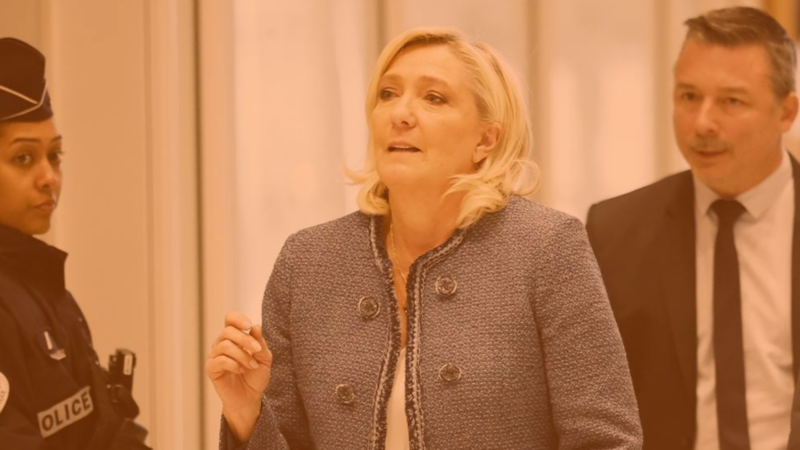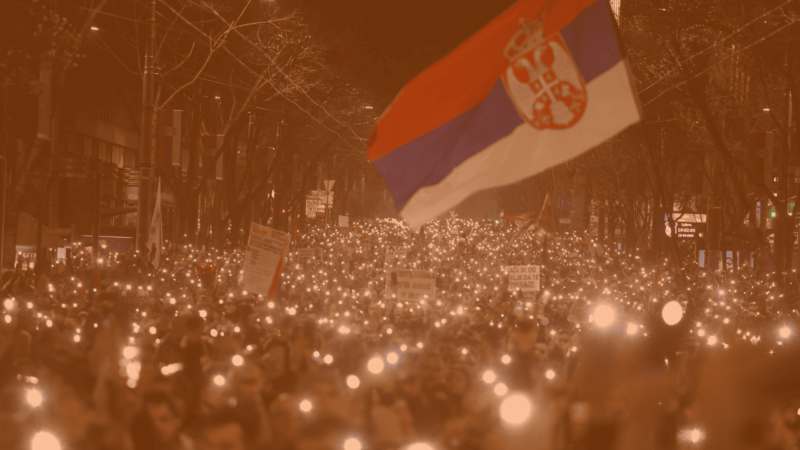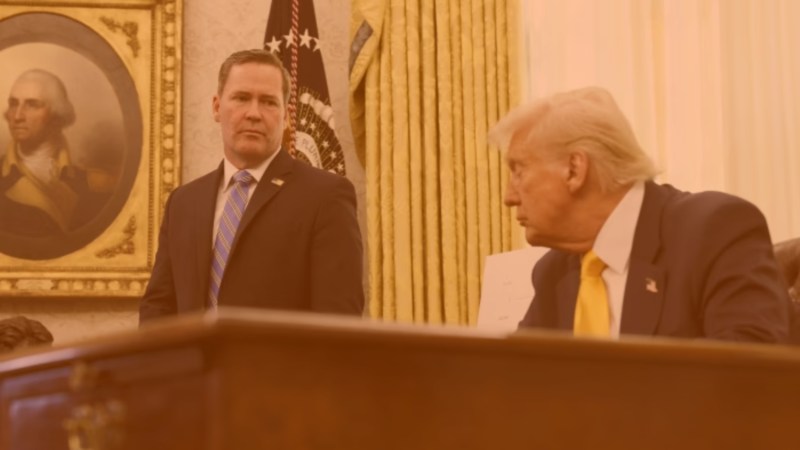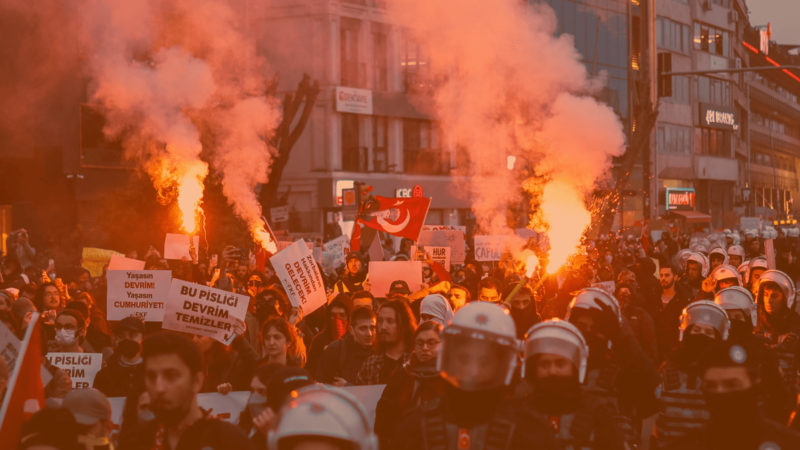When Beethoven composed his ‘Ode to Joy’ in 1824 he probably wouldn’t have thought that merely 200 years later the Donald Trumps of this world would listen to it, while the masses are rioting in the streets outside. Actually, not all people became brothers during the G20 summit on July 7 – 8 in Hamburg this year. Three months later fiery public debates about the tremendous violence during the summit days still continue and every day more coverage of police violence against protesters crops up in social media.
Apart from that, major media outlets still seem to refuse any coverage on the realistic alternative policy approaches that were framed and discussed e.g. during the Alternative Summit on July 5–6. So the world has gone back to business as usual and the question “what actually changed with the protests?“ sounds ever-increasingly ironic. But why is that so? As activists are our protests maybe failing to address a crucial aspect of the G20’s power?
Colonizing our futures
One issue completely missing in the agenda of protests and counter-events during the summit is a very peculiar form of colonization that renders all of us alike its subjects. The G20 states are not merely colonizing the world economically and geopolitically. They also wield a timesavvy colonization of our futures. How does that happen?
Since the 2011 summit the G20 has eagerly incorporated into its proceedings and policy agendas a specific kind of knowledge through consultations with ‘Think 20’ – a think tank focusing on future scenarios. “What’s the problem with that?” one might ask, because after all scientific consultation in the process of policy-making seems to be a good thing. Yes and no. Scenario building is nothing new. In the 1950s it started out as a military planning tool during the cold war and spread more widely during the 1970s and 1980s in the form of corporate foresight in the economy. After the fall of the iron curtain and from then on, strategic foresight tools were implemented in almost every domain of policy-making and now national and global power bodies (USA, EU, NATO, ASEAN, etc.) incorporate strategic foresight into their decision-making on almost every issue.
The two major methods of strategic foresight are forecasting and backcasting. Forecasting is a prognosis of future events grounded in analyses of present trends, while backcasting is a prognosis of desired futures accompanied by strategic guidance on how to get to these particular futures. So these methods refer to probable, possible and preferred future scenarios.
Normative projection
The problem with the future is that it is highly uncertain, meaning there is a profound lack of information about it. Now a rich tradition of organizational studies tells us that whenever social actors lack information to handle a situation they rely on social mechanisms such as power relations, institutions, networks, routines and traditions. However, it is no secret that all the latter are normatively structured as they carry certain social values implicit within them. As a result, strategic foresight is not just about analyzing and calculating but rather about normatively projecting narratives about the future that unavoidably carry the values of those people creating and using them.
This is seldom reflected in scenario building. So these narratives – treated as objective and rational – are very powerful as they enable actors to manage future uncertainties in the present and act accordingly to bring about preferred futures.
Although one might consider future scenarios as fictional, the minute they are regarded as credible they must inform, justify and legitimate decisions. Therefore, they help unfold economic and social processes, which means that they have all too real consequences.
Social futures are indeed constructed, and foresight tools now play a major role in this process. But because they require huge amounts of financial, intellectual and social capital, the capacities available to build scenarios are distributed highly unequally.
Governance – local, national and global – is not possible to imagine without strategic foresight any longer. But the latter is not at all pluralist and inclusive as of now. At this moment in time, it is at the service of specific economic and political elites. In the context of ‘Think 20’, a minimal and privileged faction of the global population (without any democratic mandate) creates these future narratives, which are then deployed in the process of global governance.
In one respect in particular the ‘Think 20’ scenarios could be accurately described as the utilitarian future–making tools of the 1%: they do not go beyond the infinite growth paradigm. This is explicitly reflected in the G20 Leaders’ Declaration 2017. With infinite growth being the foremost reason for social inequality, neo-colonial aggression and climate change, the declaration is a mere charade. However, G20 forecasting prolongs the infinite growth paradigm into the future, while G20 backcasting draws strategic conclusions for present action from a desired future where the infinite growth paradigm is still intact. It is obvious how this process is closely tied to the notion of ‘there is no alternative’.
Moving forward – from making history to making the future
If strategic foresight is an elite tool for executing power by prolonging the status quo into the future – how can we as activists not address this issue? After all, what are political activists if they are not future makers? We struggle for a more socially just, ecologically sustainable and peaceful tomorrow and we know that this is not achievable within the frameworks of infinite growth.
Therefore, we need to uncover the power nexus as well as the normative content of these future–making tools, to distribute them more equally, and make future scenarios more pluralist and socially inclusive. Right now every human being’s future is colonized by the powerful future narratives of infinite growth, with the G20 as the major political agency that incorporates and enacts these narratives.
Unfortunately, the only future narratives in our hands right now are our so-called ‘utopian visions’, constantly refuted on the grounds that ‘there is no alternative’.
Often these utopian visions derive from a materialist conception of history, which is not wrong at all. But we also need to see how modern societies are fundamentally directed and referencing towards the future. So activists need to incorporate this same principle into their action, moving forwards from making history to making the future, thereby reclaiming the ability to construct futures from the global elites. We need to form a progressive international that – apart from its many other capabilities – has its own capacity for strategic foresight that can produce a heavyweight and substantial counter-narrative to the future narrative of infinite growth which the G20 circulates so eagerly. And there is hope.
DiEM25 – radically democratizing European futures
As a European citizen born and raised in Hamburg, Germany I regain hope by engaging in a young and very promising movement called ‘Democracy in Europe Movement 2025’ – or ‘DiEM25’ for short. DiEM25 was founded in February 2016 as a result of the experience of EU austerity politics in Greece. What became clear with the Greek Referendum on July 5, 2015 was that there is no democracy at the EU level. The sovereign people of Greece declared their rejection of the EU’s austerity policies. Nonetheless, they came into brutal effect, with heavy human costs lasting to the present day.
DiEM25 will not accept that. We are convinced that no European people can be free if other people are suppressed and that the European crises cannot be solved by returning to our nation states. And so, until 2025, we struggle to create a radical democratic European social state – by bringing into effect a real European constitution that renders all current treaties obsolete. This fully-fledged European democracy, will feature a sovereign Parliament that respects national self-determination and shares power with national parliaments, regional assemblies and municipal councils. It will dismantle the habitual domination of corporate power over the will of citizens and re-politicise the rules that govern our single market and common currency.
The democratization of EU institutions and the economy is one major task. Besides that we also have to democratize the sciences, freeing our universities from their dependence on private financing, thus enabling them to make science for social progress and emancipation – not for corporate interests. Such universities are the places for a critical futurology that can reflect its methods properly to make it a social science serving the good of society as a whole.
Other examples for truly democratic future making are the ‘Transitions Movement’, ‘Focal Engineering’ and ‘Fab Labs’. All these projects revolve around both imagining alternative futures and implementing respective technologies locally. They are community approaches that show how strategic foresight can be made available to all of the people, making it more democratic, pluralist and inclusive. Also, they are deeply related to common goods as they re-embed engineering processes in the public. Interestingly, DiEM25 calls for the provision of basic common goods (e.g. energy) in the ‘European New Deal’.
DiEM25 published its ‘European New Deal’ on March 25 this year. This is a plan to reform current EU economic policies, which would stabilize the EU crises, shift the economy towards engendering social justice and lay the groundwork for a real and solidary political union in Europe.
That sounds utopian, right? However, the New Deal can be implemented tomorrow and it is far less utopian than any conceivable claim that current austerity policies will solve the EU crises. So although it sounds utopian, it is realistic, and offers future scenarios that include all of Europe’s people.
This is because it was created in a decentralized, radical democratic process, basically including all of our 60,000 members, with the additional help of experts around the world. In my opinion, DiEM25 has the potential to tackle the G20’s future colonization of our lives so let’s join forces to widen this potential of making truly democratic futures! In these days storm clouds are forming on the horizon of change, but they are accompanied by a slight breeze of hope. There is a fresh wind blowing in this world and it is now or never that we progressives shall set sail for future shores!
This article first appeared in openDemocracy.
Sören Altstaedt Coordinator of DiEM25 in Hamburg, member of DiEM25’s Federal German Committee, main organizer of DiEM25’s actions and events during G20 summit week 2017 in Hamburg.
Do you want to be informed of DiEM25's actions? Sign up here















